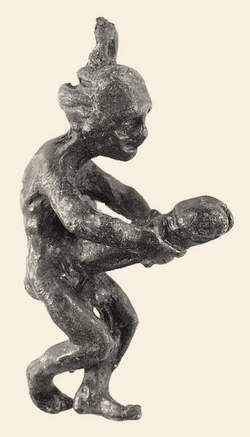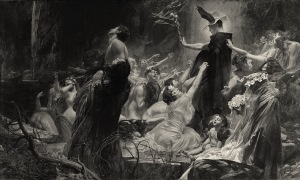Xanthe Tynehorne, Esq.’s
Compendiumof
Curious Words
I saw a plain of peerless pulchritude
wherein aboundit alkin things good
Spice, wine, corn, oil, tree, fruit, flower, herbis green
All fowls, beastis, birdis, and alkin food
Dutch, like its hillier cousin German, has something of a reputation as a harsh, guttural, and most of all ugly language. English may indeed roll nicer off the tongue (don’t tell my papa i said that), but its closest neighbour is still a beautiful tongue in its own right. To go along with all the Anglo-Saxon on this page, here are some of my favourite words in Dutch:
| A word | which means | literally |
|---|---|---|
| desalniettemin | Nevertheless… | des al “of all this” + niettemin “nevertheless, not too little” |
| gezellig | Cozy, comfortable, in that particular way that comes when, say, sitting around the sofa, drinking tea with a friend who loves and cares for you, or at a party with your best mates. | from the same root as “silly” |
| koeienletters | Big, massive, unmissable type — see “second coming type” further down the list. | “cow letters” |
| de oerknal | The Big Bang. | “the ur-bang” |
| uitwaaien | To clear one’s mind by going out for a walk in windy weather. | “to blow out” |

However curious it may seem for an oil-ship to be borrowing oil on the whale-ground, and however much it may invertedly contradict the old proverb about carrying coals to Newcastle, yet sometimes such a thing really happens; and in the present case Captain Derick De Deer did indubitably conduct a lamp-feeder as Flask did declare.

The Third Defenestration of Prague occurred on 10 March 1948. During the closing stages of the communist takeover in Czechoslovakia, Jan Masaryk, the popular foreign minister and son of Tomáš Masaryk, fell – or more likely was pushed – out of a window.
Defenestration might be an option too. May I recommend Linux?


[H]e would sit over the fire with a book in his hand, staring over it into the red glow with his brows knit, and a dogged, almost sullen look about his mouth. [...] Mrs. Gray, who was a woman of determination, and who had a horror of what she called ‘the doldrums,’ made up her mind that she had had enough of this kind of thing[...]
- deep-seated → *deep-seeded
- for all intents and purposes → *for all intensive purposes
- Alzheimer’s disease → *old-timer’s disease
Pearl, in utter scorn of her mother’s attempt to quiet her, gave an eldritch scream, and then became silent.
You can hear the song of a Kauaʻi ʻōʻō endling online.

The phenomenon of modern gastrodiplomacy got its start in Thailand. Thai cooking and restaurants had been on the rise around the world since the 1980s. But in 2002, the Government of Thailand decided to use these kitchens and restaurants as new cultural outposts to promote brand Thailand and encourage tourism and business investment.
Also called soft hail or popcorn snow.
And, by the way, during those halcyon days (the halcyon was there, too, chattering above every creek, as he is all over the world) we fought another battle.

I rose by candle-light, and consumed, in the intensest application, the hours which every other individual of our party wasted in enervating slumbers, from the hesternal dissipation or debauch.
See also crastinal: of or pertaining to tomorrow.
God does not play dice with the universe; He plays an ineffable game of his own devising, which might be compared, from the perspective of any of the other players, to being involved in an obscure and complex version of poker in a pitch dark room, with blank cards, for infinite stakes, with a dealer who won’t tell you the rules, and who smiles all the time.


See also Noumenia, the first day of the month in the Greek lunisolar calendar, and the phrase Greek kalends, a metaphorical date which means something will never happen.
> That's a trifle patronising Se th!
Only a trifle? I’ll have to try harder. (BTW, the idiot apparently adds spaces to people’s names to prevent kibozing. It doesn’t help when you're replying to me in a newsgroup I read; I’ll find that article just fine. Besides, I don’t kiboze.)


I see and hear daily, that you of the clergy preach one against another, teach, one contrary to another, inveigh one against another, without charity or discretion. Some be too stiff in their old mumpsimus, other be too busy and curious in their new sumpsimus. Thus, all men almost be in variety and discord, and few or none do preach, truly and sincerely, the word of God, according as they ought to do.
* Sumpsimus is sometimes used to mean the opposite: one who insists on using the technically correct term instead of a vastly more common and intelligible, if slightly inaccurate, form. (“Erm, ackshually, it’s called GNU/Linux…”)
Wait a sec.... You mean.. this is a GAME??
And here I thought that nine tae five job my mun goes to everyday was a game and Norrath was my home..
Any suggestions on how to successfully turn this into a good SL, which will bring the characters back into the range of normalcy, without leaving the muns feeling deprived of everything their characters earned?
New students in Greenbank and Carnatic Halls start moving in overmorrow.
See also ereyesterday: the day before yesterday.
As soon as she had smiled her face altered again, and the petulant expression peregrine to her features took control.

Less becomingly Origen states that when the Pythoness sat down at the mouth of the cave, “the prophetic spirit of Apollo entered her private parts”; […]
You can now visit a cocktail bar called Scofflaw in Chicago, or buy beer from Atlanta’s Scofflaw Brewery. So much for prohibition.

Thursday morning, walking to breakfast at the Red Flame Coffee House on West 44th Street, I noted a reinforced police presence outside Grand Central Station. The cover of Thursday’s New York Post used Second Coming type to blare the W-word — not weasel but war.

- Hebrew שיבולת (shibbolet) “ear of wheat; stream, torrent”, used to distinguish Gileadites from Ephraimites trying to return home according to the Hebrew Bible
- Dutch Scheveningen, used to distinguish Dutch from occupying Germans during the second world war
- English lollapalooza, used to distinguish U.S.-American soldiers from the Japanese during the second world war
- English (h)aitch, used to distinguish between Catholics and Protestants during the Troubles
When we are skyclad, we are sharing ourselves as we truly are with the coven. There are no defences, no masks, no personas and nothing psychologically or physically to hide behind. This is the essence of sacred sexuality and the flow of feeling about that magic circle.
See also speyman and speywife, for male and female fortune-tellers.
This is the original meaning of the word. The meaning of “object, matter” evolved from the use of the word to describe what was being discussed at things, and then to any object or matter of importance.
This doesn’t qualify for the list on meaning and sound alone, but that etymology is so convoluted i simply had to put it here. My apologies if it’s a bit difficult to read.
The sense of “supernatural, uncanny” comes from the usage of the term “weird sisters” in reference to the three Fates in Germanic myth. Shakespeare’s Macbeth repopularised the term and heavily influenced it to almost always just mean “strange”; most other senses are now obsolete, though the noun form hangs on in the learnèd borrowing wyrd.
See also deaseal, deasil, deosil: clockwise. The latter spelling is, if i recall, the dominant one among Witches, but the former two are perhaps truer to the etymology from Scots Gaelic deiseil.
See also nadir: the point in the sky directly beneath the observer; the time of something’s lowest depression.
Part of a whole system of esoteric exponential terms used before the advent of superscript notation, such as:
- zenzicubic: the square of a cube, or a number raised to the fifth power
- sursolid: a prime-numbered exponent — the fifth power is the first sursolid, the seventh power is the second sursolid, the eleventh power is the third sursolid, &c.
Added six new words: communiqué, exophonic, importuous, ithyphallic, peregrine, and qualtagh.